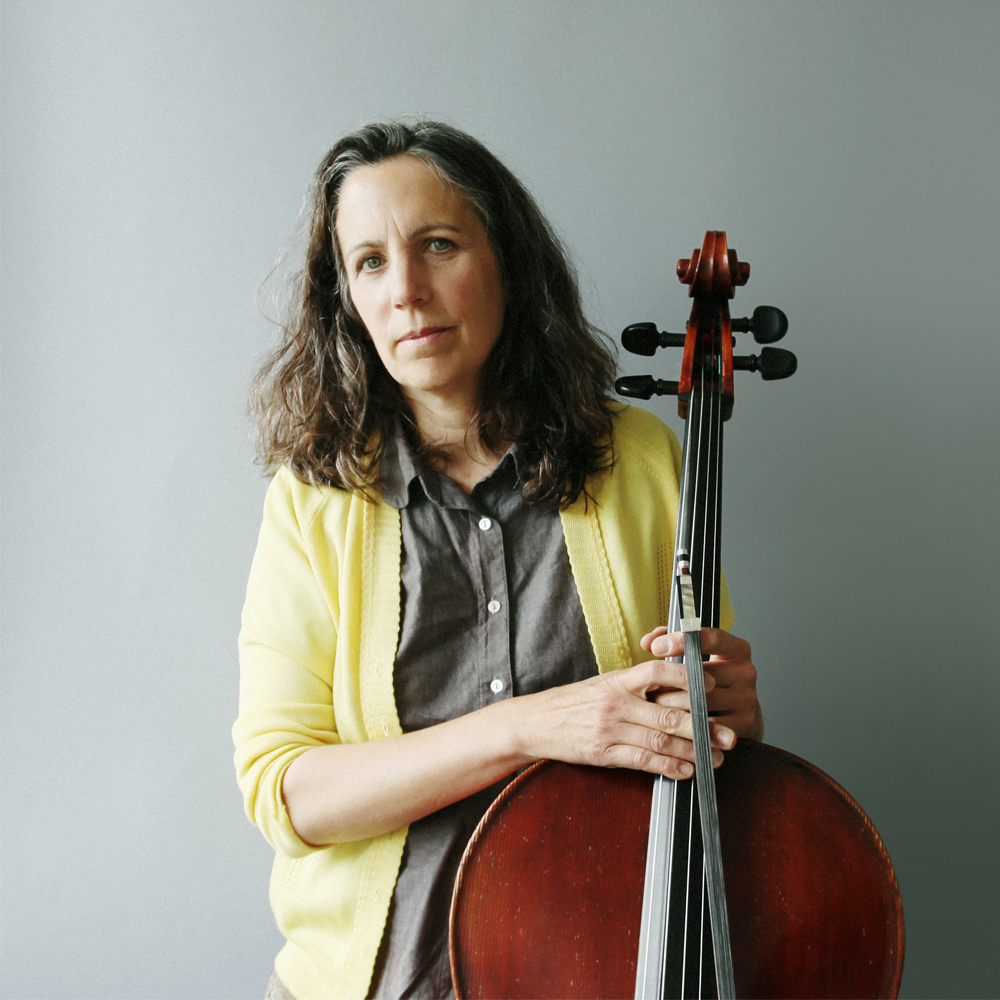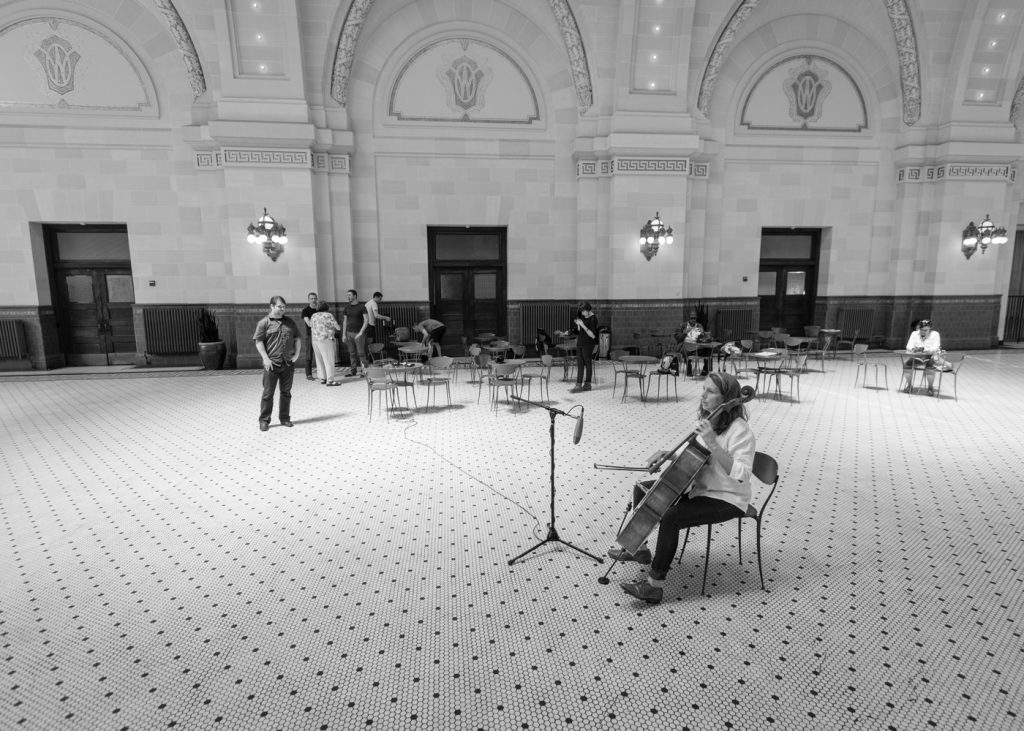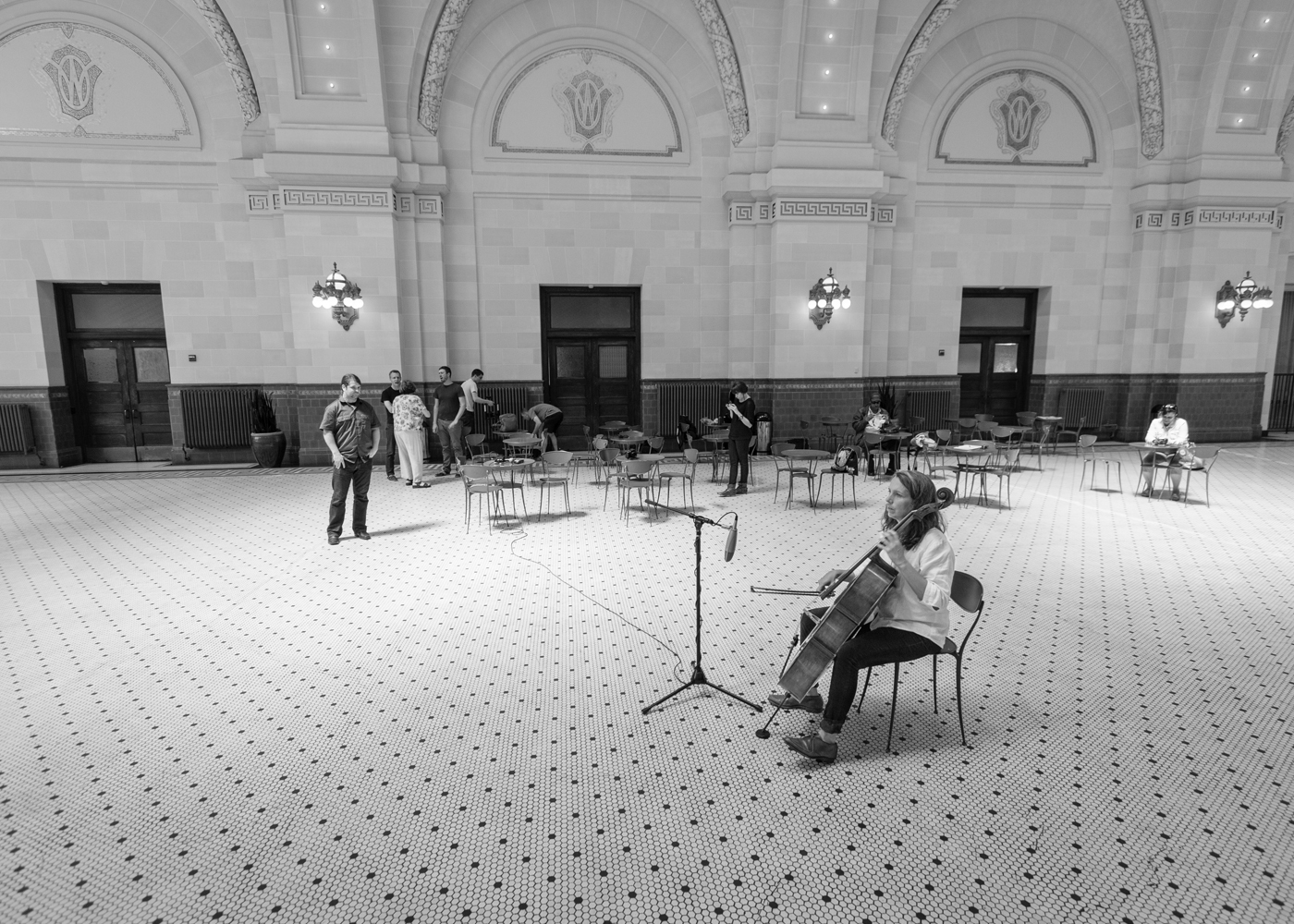Golden Time: An interview with Lori Goldston

Lori Goldston (b. New York, 1963) is an experimental cello player and composer. In the mainstream world she is probably best known as the cellist for Nirvana’s MTV ‘Unplugged in New York’. On June 25th and 26th, she is artist-in-residence at OCCII in Amsterdam. Just before kicking off her European tour, she took the time to speak with us about finding new sounds, making classical music less uptight and what’s so exciting about the Seattle music scene.
“I remember this real longing,” she says over the phone from a coffee bar in Seattle. “As a kid I played cello and guitar and I was trained in classical music. I was into the music, but the classical world was never really comfortable to me. I was looking for something else. I could relate much more to the feeling of jazz and the early folk and blues people.”
Because there’s a longer tradition of playing jazz, folk and blues on guitar, it would have made sense for Goldston to focus on guitar instead of cello. But she never thought of quitting cello: “I love that sound so much. I remember that in high school I played along with a record of Eric Dolphy sometimes. I didn’t really know how to play it with my cello, but I thought it might just enter my consciousness in that way.”
drummers
In the mid-eighties, she moved to Seattle where she immediately felt at home in the music scene. “There was a group of very good and fun improvisers here,” she remembers. She learned how to play with drummers, accordionists and guitar players and that had an effect: “I started to sound like them,” she says.
Goldston soon became known for her unconventional ways of playing cello. She played cello in rock bands, and improvised with both jazz and classical musicians. Since 1991, she has played with her husband Kyle Hanson in a band called The Black Cat Orchestra. Together they play with the indie folk singer Mirah, they compose music for silent movies, and they sometimes play weddings. Goldston is also a member of the doom metal band Earth.
award
Often she surprises her audience with new ways of playing music. Like last year when she was asked to lead an orchestra during an award ceremony. “What they probably had in mind was for me to just give them a chart from The Black Cat Orchestra. But to me it seemed like a nice opportunity to do something new. It was at The Moore Theatre in Seattle, a big theatre.” She laughs: “I was getting an award myself, so I probably felt like I had a certain kind of authority, and that I could just make them do what I wanted.”
She made the orchestra play a whole piece by improvising. She gave the musicians only a few indications on how to play, a very unusual thing in the orchestral world. But Goldston is enthused about the experience: “I like it when so many people work together while there’s still a feeling of everybody’s individual will and judgement. I think there’s a looseness and there’s a certain amount of chaos, but then also, it’s together at the same time and it has that power that an orchestra has, that magical quality of so many people playing together.”
Not all of the players liked it, but a few of them liked it a lot, and Goldston is hoping to bring improvisation to the orchestra again: “It’s the kind of thing I would like to do more. I would like to be able to drop into different places and work with ensembles. It’s nice to be on tour, but being just one day in every city always feels a bit too short. Two days in Amsterdam will be a luxury for me!”
outdoor
When it comes to making her own music, she doesn’t easily run out of new things to try. Recently she has been listening to old field recordings a lot. “I like listening to outdoor recordings,” she says. “What I like about them is that you can really hear the air. There’s one Folkways recording Traditional Folk Dances of Japan which was recorded at a festival and I think the musicians dance while they were playing. You can hear them come and go. I try to make my cello sound like that too, to get it more airy. It’s a whole new realm to explore.”
“I’ve also been interested in adding weather to my playing,” she continues. “For example when I’m walking around Seattle and it’s very chilly, you can sort of hear the wind and the weather, depending on where you are on the hills. And I’m convinced you can hear it too when it’s cloudy.”
uptight
Besides playing music herself, she’s also a teacher. But, as with playing music, she has her own ideas about teaching. “I really like classical music and the literature for it,” she says, “so I do teach it. But I never liked the creative atmosphere of the classical world. It’s too uptight. You just feel so shut out by classical music. It’s very sad because it doesn’t seem like it’s built into the music. It seems like there’s just a lot of cultural shit that comes with it. I think that people who teach that music should stop being so uptight. They should freaking relax and show that it’s just really lovely. Then it can be very interesting to kids to play.”
She continues: “But unfortunately it seems like many people’s introduction to music is somebody telling them ‘this is right and this is wrong’. There’s something very judgemental in the way that people play classical music. While in the end there’s not really a right or wrong. You can also say ‘OK when you play in this tradition, this is how you do it, you can do it in other ways, but this is this tradition’.”
safe
According to Goldston, not only classical music, but popular music too has a certain conservatism. “I always stayed removed from the music industry. I think that in general the music industry is very conservative. The music industry considers people a lot more stupid and closed than is really the case. I think people are more open and that they like a variety. But as soon as money is involved, the music industry plays it safe, because what if the stuff they are bringing out is weird and nobody wants to hear it? I can’t work in such an environment, so I try to operate as much as possible outside of it.”
The future of music looks promising, Goldston thinks. “I have been noticing with musicians I work with, often people in their twenties, that they are more relaxed about different styles and disciplines. The boundaries are a lot less sharp for people than they have been in the past. That opens it right up. In that kind of environment anything can happen. Right now in Seattle, it isn’t an exception if a show night combines a metal band and a pop band and then an improviser.” She speaks with affection when she speaks about Seattle: “There are lots of semi-underground places: The Josephine, The Heartland, The Good Shepherd Centre Chapel. They’re great for both Seattle bands and touring acts. There’s such a great climate here right now, it’s a golden time.”
Lori Goldston plays at OCCII, Amsterdam, on June 25th and 26th.



Gouden Tijden: Een interview met Lori Goldston
Lori Goldston (New York, 1963) is een experimentele cellist en componist. In de mainstream muziek is ze waarschijnlijk het best bekend als de cellist vor Nirvana’s MTV ‘Unplugged in New York’ optreden. Op 25 en 26 juni is ze artist-in-residence bij OCCII in Amsterdam. Vlak voor de start van haar Europese tour, nam ze de tijd om met ons te praten over de zoektocht naar nieuw geluid, klassieke muziek minder uptight maken en wat er zo bijzonder is aan de Seattle muziekscene.
“Ik herinner me dat ik ergens sterk naar verlangde,” zegt ze over de telefoon vanuit een koffiebar in Seattle. “Als kind speelde ik cello en gitaar en ik was klassiek getraind. Ik hield van klassieke muziek, maar in de klassieke wereld heb ik me nooit echt op mijn plek gevoeld. Ik zocht ergens anders naar. Ik kon veel meer met jazz en de vroege folk en blues.”
Omdat gitaar een langere traditie heeft in jazz, folk en blues dan cello, zou het niet raar zijn geweest als Goldston zich in plaats van cello op gitaar had gericht. Maar ze wilde haar cello niet opgeven: “Ik hou zó van dat geluid. Ik herinner me wel dat ik op de middelbare school soms meespeelde met een plaat van Eric Dolphy. Ik wit niet hoe ik met die muziek mee moest spelen op cello, maar ik dacht dat die kennis vanzelf wel mijn onderbewustzijn binnen zou kruipen als ik het maar probeerde.”
drummers Midden jaren tachtig verhuisde ze naar Seattle waar ze zich meteen thuis voelde in de muziekscene. “Er was een groep erg goede en leuke improvisators hier,” herinnert ze zich. Ze leerde hoe ze samen met drummers, accordeonisten en gitaristen kon spelen. “Ik begon zelfs als die instrumenten te klinken.” Al snel werd ze bekend om haar onconventionele manier van spelen. Zo speelde ze cello in rockbands, en improviseerde met zowel jazz- als klassieke musici. Sinds 1991 heeft ze samen met haar echtgenoot Kyle Hanson de band The Black Cat Orchestra. Samen spelen ze met de indie-folk zangeres Mirah, componeren ze muziek voor stomme films, en spelen ze soms op bruiloften. Goldston is ook lid van de doom metalband Earth.
prijs Vaak verrast ze haar publiek met geheel nieuwe manieren van muziekmaken. Zoals afgelopen jaar, toen ze was gevraagd om een orkest te leiden tijdens een prijsuitreiking. “Waarschijnlijk had de organisatie verwacht dat ik bladmuziek van The Black Cat Orchestra aan het orkest zou geven. Maar voor mij was het een kans om iets nieuws te doen. Het was in The Moore Theatre in Seattle, een groot theater.” Ze lacht: “Ik kreeg zelf ook een prijs, dus ik had misschien ook wel het gevoel dat ik een soort autoriteit had, en dat ik gewoon kon doen wat ik zelf wilde.”
Ze liet het orkest het hele stuk improviseren. Ze gaf de muzikanten enkel een paar algemene aanwijzingen over hoe ze moesten spelen, iets heel ongebruikelijks in de orkestwereld. Maar Goldston is enthousiast over het experiment: “Ik hou ervan als zoveel mensen samenwerken, en je toch ieders individuele ideeën terughoort. Ik denk dat het soms wat los klinkt, en ook wel chaotisch, maar doordat het tegelijk wordt gespeeld heeft het kracht, en zit er de magie achter dat er zoveel mensen tegelijk spelen.”
Niet alle muzikanten vonden het een geslaagd experiment, maar sommigen vonden het érg geslaagd, en Goldston hoopt meer orkesten met improvisatie in aanraking te brengen: “Het is het soort werk dat ik meer zou willen doen. Ik zou graag op verschillende plekken met ensembles werken. Het is fijn om op tour te zijn, maar ik vind het altijd jammer dat ik dan maar één dag in elke stad ben. Twee dagen in Amsterdan zometeen is een luxe voor mij!”
buiten
Goldston zit niet snel zonder nieuwe ideeën om uit te proberen. Zo luistert ze de laatste tijd veel naar oude buitenopnames. “Ik hou van muziek die buiten is opgenomen,” zegt ze. “Wat ik er zo goed aan vind is dat je echt de lucht hoort. Er is een Folkways-opname Traditional Folk Dances of Japan die was opgenomen tijdens een festival. Ik denk dat de muzikanten dansten terwijl ze speelden, je hoort op de opname dichterbij komen en afstand nemen. Ik probeer zelf ook om meer lucht en beweging in mijn cello te krijgen. Het is een heel nieuw gebied om te verkennen.”
“Het weer, dat zou ik ook wel in mijn muziek willen verwerken,” vervolgt ze. “Bijvoorbeeld, als ik door Seattle loop en het erg koud is, dan kun je de wind en het weer om je heen horen, dat hangt een beetje af van waar op de heuvels je bent. Ik ben ervan overtuigd dat je de wolken ook kunt horen.”
muziekles
Naast het maken van haar eigen muziek, is ze ook docent. Maar, zoals in haar eigen muziek, heeft ze zo haar eigen ideeën over muziekles. “Ik hou erg van klassieke muziek en de bladmuziek ervoor,” zegt ze. “Dus ik geef er wel les in. Maar ik heb nooit van de sfeer rondom klassieke muziek gehouden. Die is zo stijfjes. Je voelt je altijd een beetje buitengesloten door de klassieke muziekwereld. Dat is erg jammer, want het zit niet in de muziek zelf. Maar er is wel veel culturele shit rondom de muziek. Ik vind dat mensen die klassieke muziek doceren dat minder stijfjes moeten doen. Relaxter juist, en laten zien dat de muziek gewoon erg, erg goed is. Dan kan het ook een stuk interessanter worden voor kinderen om die muziek te spelen.”
“Maar jammer genoeg,” zegt ze vervolgens, “lijkt het wel alsof voor veel de eerste kennismaking met klassieke muziek alleen maar een les is in wat ‘juist’ is en wat ‘onjuist’ is. Er zit iets enorm oordelends in de manier waarop mensen klassieke muziek spelen. Terwijl er uiteindelijk niks goed of fout is. Je kunt ook zeggen OK, als je in deze traditie speelt dan is dit de manier waarop men dat doet – het kan ook op andere manieren, maar dit is de traditie.”
safe
Volgens Goldston is niet alleen klassieke muziek, maar ook popmuziek op een bepaalde manier conservatief. “Zelf ben ik altijd op een afstandje gebleven van de muziekindustrie. Ik denk dat de muziekindustrie in z’n algemeenheid vrij conservatief is. De muziekindustrie veronderstelt vaak dat mensen een stuk dommer en eenzijdig zijn dan ze in werkelijkheid zijn. Ik denk dat mensen juist erg open zijn, en van variatie houden. Maar zodra er geld in het spel is, speelt de muziekindustrie liever op safe, want wat als de muziek die ze uitbrengen raar is en niemand die wil kopen? In zo’n omgeving kan ik niet werken, dus ik blijf er zo veel mogelijk buiten.”
Toch ziet de toekomst van de muziek er veelbelovend uit, volgens Goldston. “Ik zie het bij de muzikanten met wie ik werk. Vaak zijn dat mensen van in de twintig, die zijn een stuk relaxter over verschillende muziekstijlen en disciplines. De grenzen zijn tegenwoordig al een stuk minder scherp dan vroeger. Dat opent vele mogelijkheden. In zo’n omgeving kan van alles gebeuren. Op dit moment is het in Seattle al geen uitzondering meer als een showavond een metalband, een popband en een improviseur op één avond boekt. Goldston spreekt met genegenheid als ze over Seattle vertelt: “Er zijn veel semi-underground plekken; bijvoorbeeld The Josephine, The Heartland, The Good Shepherd Centre Chapel. Die plekken zijn geweldig voor zowel tourende bands als acts uit Seattle. Er is hier zo’n goed klimaat op het moment, het zijn gouden tijden.”
Lori Goldston speelt in OCCII, Amsterdam, op 25 en 26 juni 2013.
•


